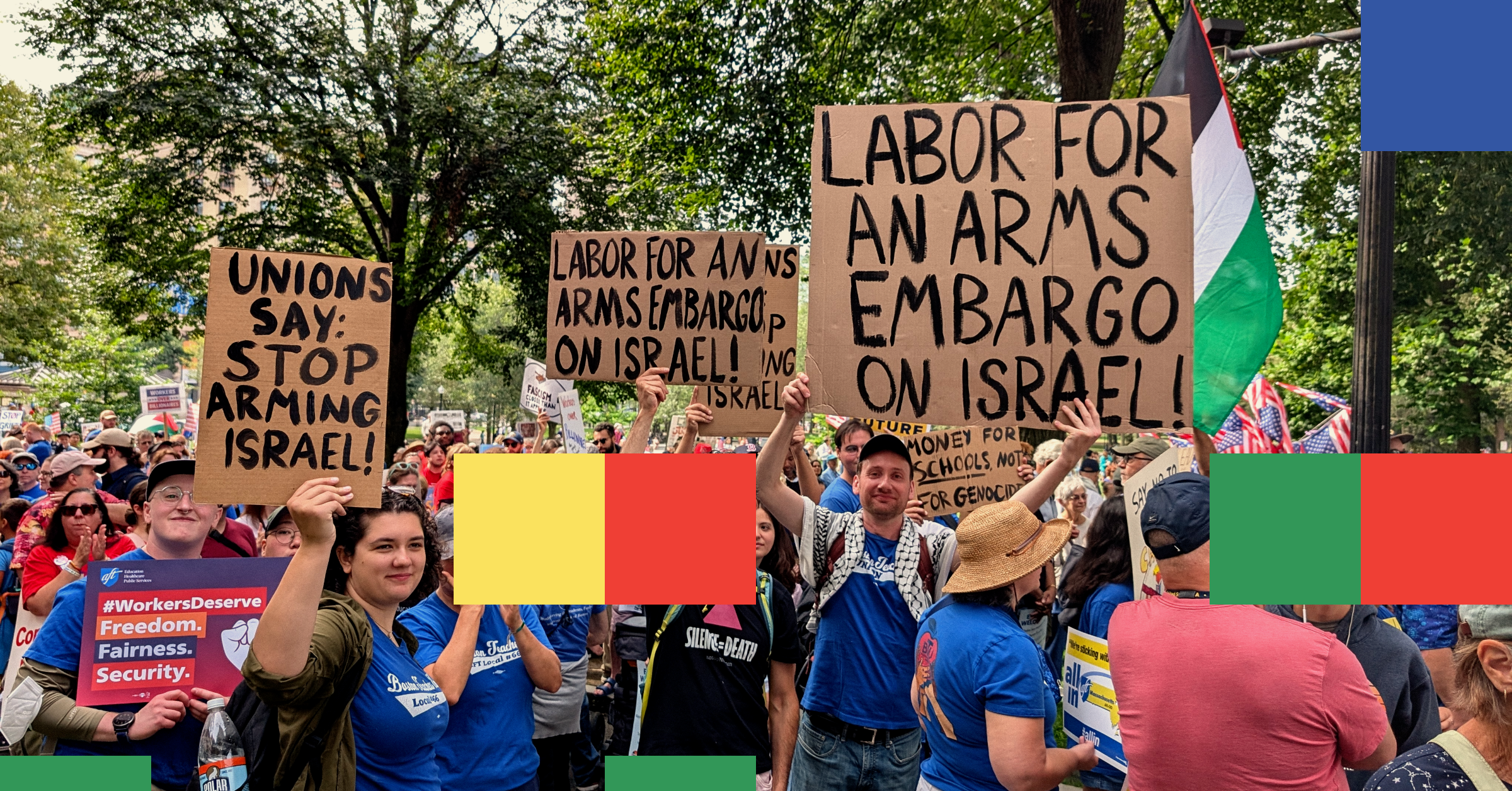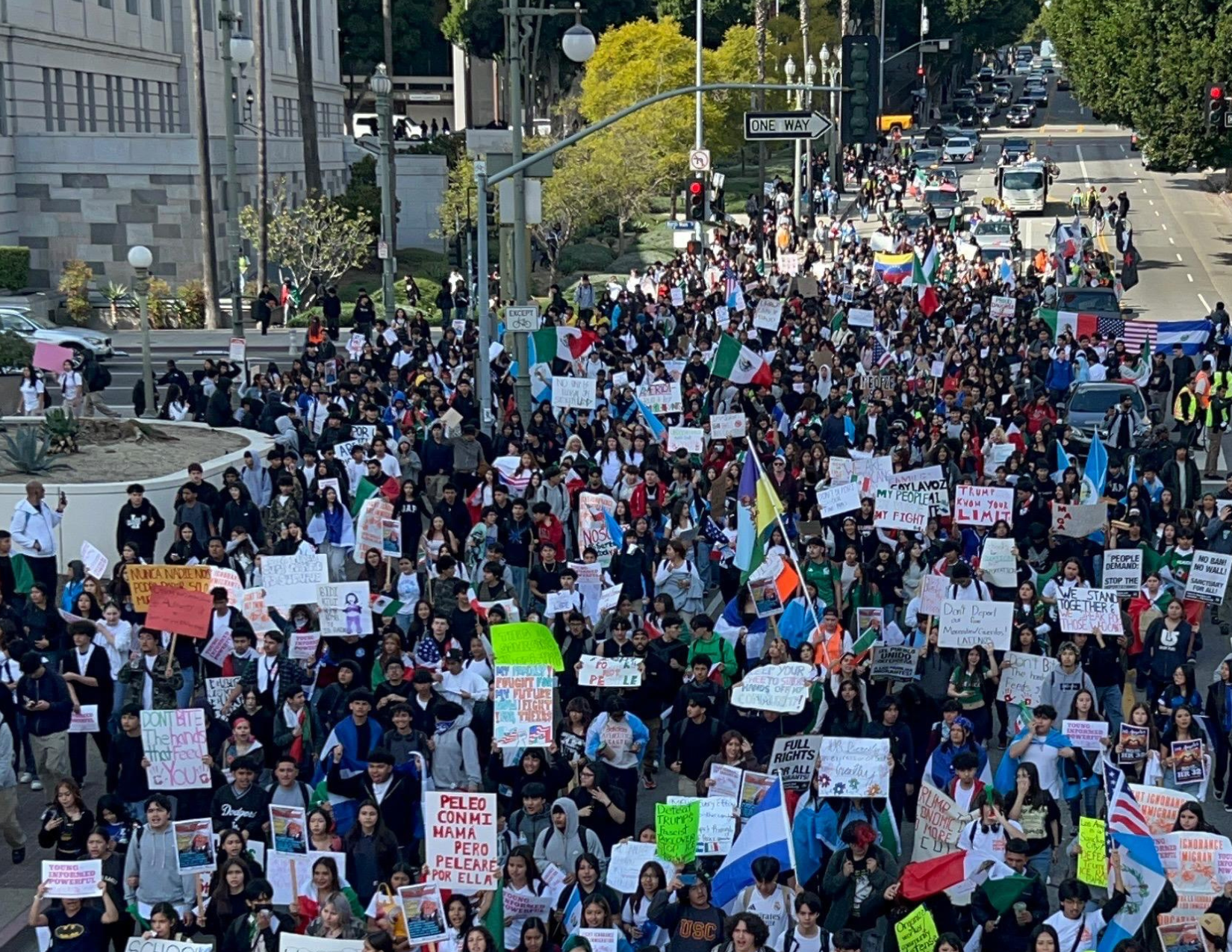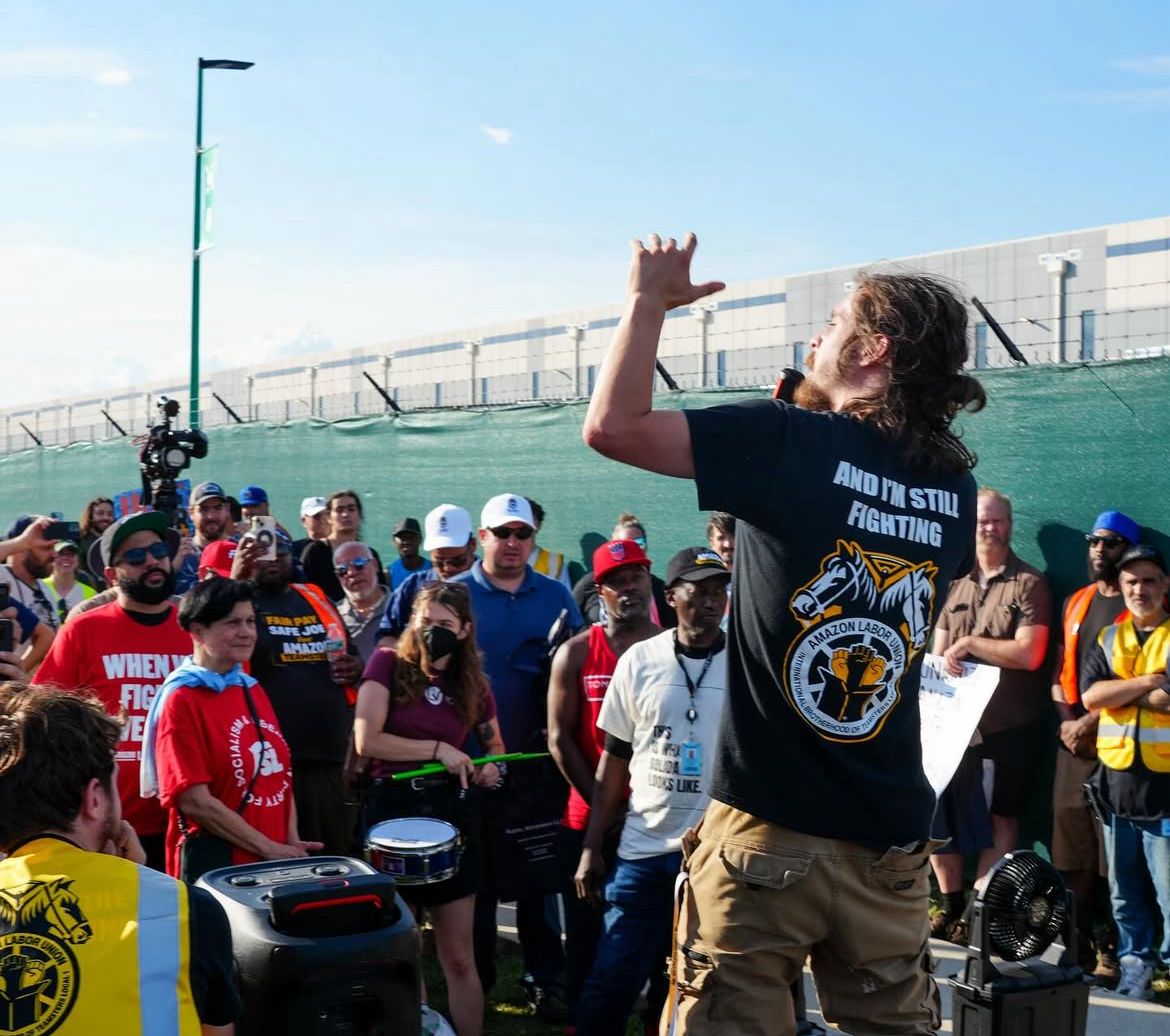In the fall of last year, a group of worker activists in the Boston Teachers Union (BTU) organized to brainstorm what we could do next about Israel’s genocide. The year previous, our union passed a ceasefire resolution in response to the siege. But almost a year later with no end in sight, and with multiple national unions including UAW and SEIU advancing on their initial ceasefire call to include an arms embargo, we knew we needed to act.
The first question was how. When one of our members brought the ceasefire resolution forward, it was at the end of business, when most attendees at the union’s membership meeting had already left. The first thing we decided was to be loud and up front so we had the greatest likelihood of passing a resolution with more weight behind it, while also raising awareness of the genocide among the broadest possible swath of membership.
At both the membership meeting the month before, as well as the day of, we flyered the entrance of the hall with “Educators for Peace” pamphlets, asking members to sign our petition and put up the flyers in their buildings so that more members could hear about and join our effort.
The next difficult question was how leadership would react. We faced the choice between alienating friendly leadership by bringing it directly to a membership meeting, or first bringing it to the Executive Board for a vote and then forwarding it to the membership. Some of our members were worried about the latter option: what if the board voted it down? What if, by waiting for the board, we were giving our pro-Israel opponents enough time to organize effective opposition?
We ultimately decided to take no shortcuts and follow convention to go through the EBoard first. We were all well-aware of how destructive pro-Israel members had been in other locals in response to even ceasefire resolutions, but we also knew that membership deserved to hear a full debate and that pro-Israel complaints about the union “not knowing enough” or the genocide “not being union business” would probably backfire. We also knew that, if we skipped the President’s preferred procedure around member-made resolutions, we would be making unnecessary enemies and taking the focus off Palestine to instead quibble over convention. To paraphrase Farrell Dobbs, we would aim our fire at the genocide and catch anyone opposed to our resolution in the middle.
As it turned out, the the board unanimously passed the resolution after fantastic testimony from membership about why the union needed to take a stance against genocide. Our motion would be included in the president’s report at the next membership meeting, and though pro-Israel members were bound to force it to the floor to vote, we felt ready to win the argument.
The Big Meeting
The night before the membership meeting, we were confident: we had organized dozens of our co-workers to turn out to vote and had lined up an incredible mix of both Palestinian and Jewish members to speak in favor of the resolution. We also organized a big crew of members to canvass both at the doors and inside. Thanks to our efforts, every member left the meeting with a copy of our resolution and a flyer about our work. Almost universally, members thanked us for what we were doing, and some had particularly personal reasons: one teacher told me “of course I support an arms embargo, my wife and children are Palestinian.”
As anticipated, the pro-Israel membership organized too, though their showing wasn’t nearly as impressive. Their four speakers could not compare to our dozens, in quantity or quality.
Our first speaker was a comrade who had been part of our work from the beginning. A Palestinian social worker, he talked about his time working as a peacekeeper on the Lebanese border. Then, a Jewish teacher talked about what their family experienced in the Holocaust and what it means to say “not in our name.” A Palestinian retiree described what it’s like to live in an occupied land. A mother of Palestinian children decried the Islamophobia and racism her children have experienced in school. A new teacher connected the genocide to domestic police repression against the encampments and in our communities. The speeches were not just individually moving, but a testament to the diversity of our union and movement.
Eventually, we had to cut the speeches short while more than a dozen members were still in line to speak in favor — we had long exhausted any speakers opposed and the room was ready to vote. Almost unanimously, the packed room moved to pass the arms embargo resolution, joining the call of dozens of unions across the country for an end to military shipments to Israel.
From Statements to Structures
A statement isn’t worth more than the sum of its parts — what gives statements meaning is the degree to which membership is ready to fight for them. It’s one thing for the union to put out a statement about an issue, but will that position be included as a condition in the union’s endorsement process? Will union members call their congressional representatives about it? Will the union sponsor rallies about the issue? I’m personally confident that BTU’s statement (as well as personal calls made to elected officials in its aftermath) are part of why our Senators Markey and Warren voted, for the first time, to stop weapons shipments just days later. However, we all recognized there was still a lot of work to do to continue to build this movement in the union.
That work comes on two fronts. First, it’s in shopfloor organizing. It’s great to pass a statement, but if members aren’t “strike ready” for their own contract, they won’t be prepared to take militant action for broader political issues, either. The rank-and-file strategy is political — building worker militancy and self-organization strengthens the muscles we need to win broader societal change.
Second is union political activity. Statements are great because they can be organized from below and give an indication of what issues are important to membership when considering endorsements. But in too many unions, opaque and undemocratic committees oversee the endorsements process, so even if a union releases statements supporting radical working-class demands, its political endorsements and PAC contributions remain conservative. The relatively low rates of union turnout for elections and even lower rates of participation in the union’s electoral organizing are downstream from a process that (often, by design) lacks substantial rank-and-file buy-in.
Passing statements is therefore an important first step toward democratizing and strengthening the political arm of the labor movement because they generate energy around working-class issues that activists can channel into reforming a union’s political action committee, organizing rallies, and connecting to broader social movements. Without that follow-through though, a statement isn’t worth much more than the paper it’s printed on.
Organizing a strike ready union and a stronger political arm of the labor movement go hand in hand. After passing the resolution, we wanted to bring it back to the shopfloor by inviting speakers into our building-level faculty senate meetings to give brief presentations about the genocide and why an arms embargo is important. The problem, however, was how to introduce this political education when most buildings don’t even have a regular union meeting. To take further action to advance an arms embargo, we’d need to reach the whole union; but without robust, democratic structures, we couldn’t. Political militancy activates the same muscles as strong, strike-ready contract campaigns: active membership participation through action teams, shopfloor meetings, and rallying. To build a politically militant union, we also need to build a strike-ready one.
Where We’re Headed
We’re still tragically far from the change we want to see. It can be hard to celebrate our successes — and even harder to decide what to do next — when the news from Gaza becomes more horrific by the day. That’s doubly true for educators when the same regime shipping weapons to Israel turns those tools inward to deport our students and their families. But as socialists, we believe in the capacity of working people to forge our own future through collective action and solidarity.
From demands for fair pay to a free Palestine, activating the membership around demands important to them builds the union and builds working-class power. The rank-and-file strategy for bottom-up shopfloor organizing therefore neatly maps onto the political realm: democratize the union and you can democratize the union’s political committee; build the union’s strike-readiness and you can build the union’s political muscle. Militant and democratic unions, forged to fight the smallest workplace injustice and wielded to challenge the gravest crimes of our century, can empower everyday people to overcome the resignation and apathy our dismal circumstances create to win a better world.




